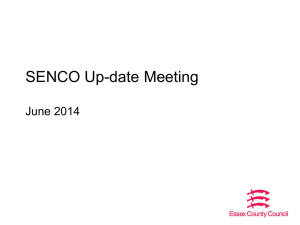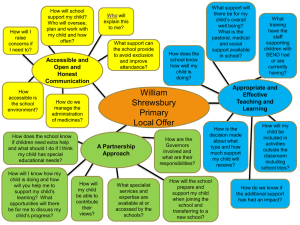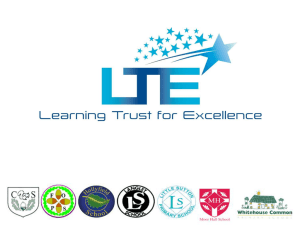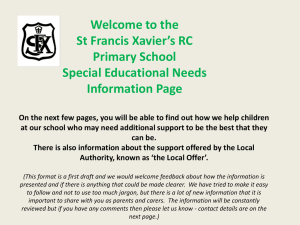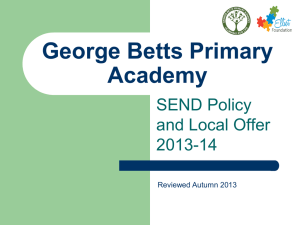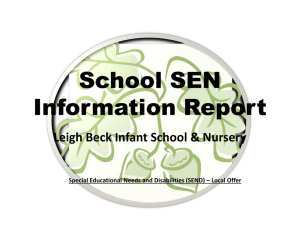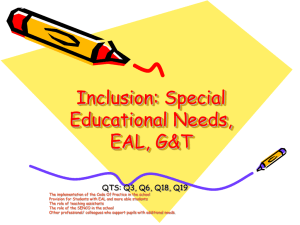DSEN Leader - George Betts Primary Academy
advertisement
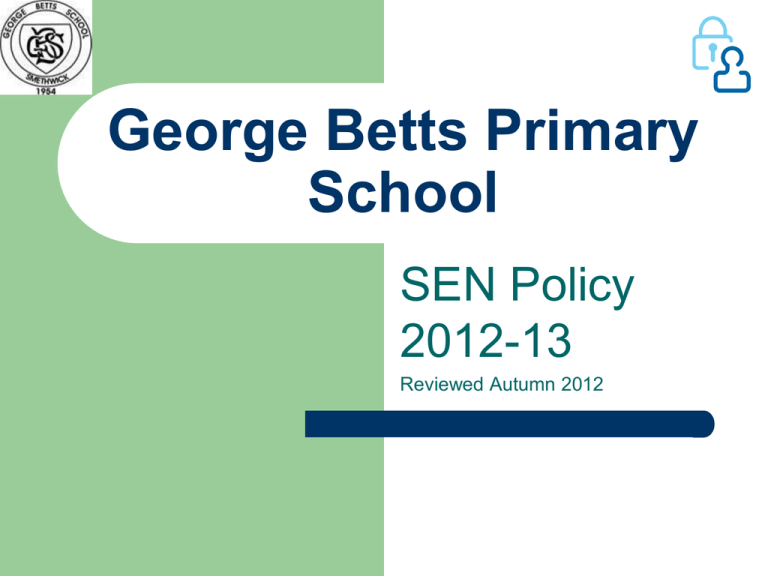
George Betts Primary School SEN Policy 2012-13 Reviewed Autumn 2012 General Statement Continue to provide a relevant, engaging and inclusive curriculum to develop: World Class Children Leading Learning Together DSEN is central to the school’s commitment to inclusive education; equality of opportunity for all. All staff set suitable learning challenges which respond to the children’s diverse learning needs. They support children in overcoming barriers to learning by assessing progress and providing support when needed. Principles and Procedures DSEN Policy Aims Setting suitable learning challenges; Responding to children and young people’s diverse learning needs; Overcoming potential barriers to learning and assessment for individuals and groups of children and young people. Promote a happy, sensitive and secure environment. Enable pupils with special needs and disabilities to develop and grow in confidence in their abilities. Help pupils develop their personalities, skills and abilities. Principles and Procedures Definition of DSEN/AEN “Children have special educational needs if they have a learning difficulty which calls for special educational provision to be made for them.” Code of Practice 2001 Children have a learning difficulty if they: Have a significantly greater difficulty in learning than the majority of children of the same age; Have a disability which prevents or hinders them from making use of educational facilities of a kind generally provided for children of the same age in schools within the area of the local authority; Are under compulsory school age and fall within the definitions above or would do so if special educational provision was not made for them. Principles and Procedures George Betts Special Educational Needs Provision The school has staff trained to work with pupils who are identified as having a special educational needs. The staff are encouraged to utilise specialist equipment and resources, including additional staffing where appropriate, in order to help each child achieve their goals. The staff liaise with specialist teachers and therapists from Sandwell and neighbouring Local Authorities. Principles and Procedures Objectives Ensure implementation of government and Local Authority DSEN recommendations. Ensure all staff implement the school’s DSEN policy consistently. Ensure any prejudice or discrimination is eradicated. Identify barriers to learning and apply appropriate measures to meet those needs. Ensure all pupils have access to an appropriately differentiated curriculum. Engage with families in supporting their child’s education. To support parents and children at home as well as at school. Guide and support all school staff, governors and parents in DSEN issues. Provide appropriate resources, both human and material, and to ensure their maximum and proper use. To involve the child in the process of identification, assessment and provision and to ensure that the child is aware that his or her wishes will be taken into account as part of the process and of the shared responsibility in meeting his or her educational needs. Regularly assess and review all special educational needs across the school, and ensure the correct provision is in place. Principles and Procedures DSEN Procedures We have three one-page policies in effect in regards to DSEN. Policies\Accessibility Policy Sept 2012.doc Policies\Reviewed Moving and Handling Procedure Aut 2012.doc Policies\Reviewed SEN Policy Autumn 2012.doc The Role of the DSEN Leader/ SENCo The DSEN Leader for George Betts Primary School is Claire Worthington and the daily SENCo is Nikki Rolfe. The DSEN Governor is Jenny Taylor. The DSEN Leader has overall responsibility for DSEN across the Federation and is accountable for all decisions in regards to DSEN. The DSEN Leader will also update Executive Principal and the Principals for both schools with any changes in regards to DSEN and will also report to Governors. The SENCo will monitor the daily running of DSEN within George Betts and will be directed by the DSEN Leader. Any issues brought to the SENCo from either staff or parents will be discussed with the DSEN Leader where a decision on next steps will be made. The Role of the DSEN Leader/ SENCo Oversee the day to day implementation of the DSEN Policy Liaising with and advising class teachers in regards to DSEN children in their class Co-ordinating with Senior Management for the provision of pupils with DSEN Updating and overseeing the records of all pupils with DSEN Maintaining the DSEN register, review action taken and outcomes Working with parents of children with DSEN Identify and provide for children with DSEN/AEN (including human and physical resources) Complete applications for additional support (PAP) Ensure that all information regarding DSEN children is shared appropriately within school Liaising with external agencies including the Sandwell Inclusion Service and other support agencies, external agencies such as Physiotherapy and Occupational therapy, SALT, mental health services (where appropriate), accessing services for children living outside the borough and voluntary bodies Contributing to INSET training for all staff Attending review meetings of DSEN pupils where appropriate Managing all DSEN staff within the school Role of the Governing Body The governing body should have regard for the Code of Practice when carrying out duties towards all children with DSEN. They should... Ensure that the necessary provision is made for pupils with DSEN. In co-operation with the Executive Principal, Principals and DSEN Leader, determine the school’s general policy and approach to suitable provision for children with DSEN. Ensure that the teachers are aware of the importance of identifying and providing for those children with DSEN. Report annually to parents on the success of the school’s policy for pupils with DSEN to include information about identification, assessment, provision, monitoring and record keeping and use of outside agencies and services. Discuss updates of DSEN at each appropriate Governors meeting. Ensure that parents are notified of a decision by the school that DSEN provision is being made for their child. Ensure that pupils with special educational needs and disabilities are included as far as possible into the activities of the school and with other children. Consult with the LA and the governing bodies of other schools, when appropriate, in the interests of coordinated DSEN provision in the area. Consult the LA and the governing bodies of other schools when it seems to be necessary or desirable in the interests of co-ordinated special education provision in the area as a whole. Appoint an DSEN governor. Role of the Executive Principal/Principal In partnership with the LA and Governing Body, place the highest priority on their statutory duty to promote high standards of education for all children, including those with DSEN Has the responsibility for the day-to-day management of all aspects of the school’s work, including provision for children with DSEN. Keep the Governing Body fully informed Work closely with the school’s DSEN Leader/SENCo Monitoring and evaluating DSEN Provision Provision for pupils with special educational needs and disabilities is updated and reviewed periodically by the DSEN Leader and SENCo Location Maps and the Provision Map are accessible on OpenHive in “Documents” for all staff to view. They show where the DSEN needs are across the school, if funding has been provided to meet DSEN needs, and what status of DSEN each child has and track progress/interventions School Action Records are reviewed half-termly by the class teacher, SENCo and DSEN Leader. New SMART Targets should be taken from APP Assessments. School Action Plus and Statemented IEPs are reviewed termly by the DSEN Leader and SENCo. New SMART Targets should be taken from the DSEN APP files and Inclusion Support Reports in conjunction with what we know the child needs 1:1 observations to be completed termly by the DSEN Leader and SENCo, and shared with LMT/SLT to monitor impact of additional adult support Regularly assess all DSEN children to determine successes and barriers to learning Provide an enhanced level of provision (including referring children who may need intervention to the DSEN Leader and SENCo) that supports and enhances learning abilities through a differentiated curriculum. Review enhanced provision and Inclusion Support involvement via annual MAP and SAP meetings. Admissions George Betts Primary School complies with the School Admissions Code (2007) School Admissions Code.doc and with Sandwell LA guidelines. DSEN Specialisms We have numerous staff members trained in... Visual Impairment Hearing Impairment Speech and Language Therapy programme delivery Delivery of Physiotherapy and Occupational therapy programmes A range of Wave 2 and 3 interventions Precision Teaching First Aid We have links with... Orchards Special School – Outreach Programme Great Bridge – Outreach Programme Local Smethwick school cluster Sandwell Inclusion Support Team The Resources LMT/SLT organise and delegate additional human resources for DSEN children through the allocation of PAP funding received from the LA and through the budget The SENCo monitors and supports each additional adult supporting DSEN children The DSEN Leader/SENCo purchases and distributes additional resources needed to enhance and support each DSEN child’s learning Ensure all support, either physical or emotional, are in place to support each DSEN child’s learning DSEN Leader/SENCo have close links with Wellbeing Support Team and Family Support Advisor to support DSEN children at home as well as at school In addition, access arrangements are made for all DSEN children, including transport, access to the building and modified toileting facilities. Identification, Assessment and Review of DSEN Each child is reviewed by the class teacher every half term via Action Planning and APP Assessments. If a child achieves less than what is expected nationally for their age, the child will be discussed with the DSEN Leader/SENCO, checking current ability levels, strengths, weaknesses, class groupings, differentiation etc. Using the Sandwell SEN Toolkit and Guidence criteria, the DSEN Leader will decide if a child has special or additional educational needs, what the barriers to learning may be, and what can be done to overcome these barriers. The DSEN Leader will refer to the Principal, and, according to the child’s needs, either an IEP or an intervention will be put in place or further advice will be sought from the Sandwell Inclusion Team. Refer to George Betts ‘SEN Procedures’ 1-page policy for further information regarding referrals. Should a child display a range of needs and clearly require more than a differentiated curriculum or is unable to have those needs met by an IEP, then advice about Formal Assessment (according to the SEN Code of Practice 2001) will be sought by the school from the LA with parental consent. IEP Reviews All Individual Education Plans (IEPs) for School Action Plus and Statemented children will be reviewed termly. Parents, children and teachers will be invited to these reviews which will be held in school with the DSEN Leader and SENCo. Achievements and next steps will be discussed, and new SMART targets set with an emphasis on achieving the targets at home as well as at school. School Action Records are reviewed half-termly by the class teacher, SENCo and DSEN Leader. New SMART Targets should be taken from APP Assessments. Access to the Curriculum At George Betts, we involve all children in their learning, and ask every child what they would like to learn about any upcoming focus. When the children’s preferences have been collected, key skills for each foci are built in to the planning and learning cycle. Additional key skills for each DSEN child are also built into the teaching and learning cycle. All learning is differentiated to all of the children’s needs within the class. A range of teaching strategies are used to include all children when accessing the curriculum. Teachers organise visits from/trips to a range of different agencies or community members in order to give all children as much access as possible. All staff use a range of ICT and practical equipment to enhance all learning as much as possible. Also see Accessibility Plan below. Complaints If a parent is unhappy with the type or amount of provision being awarded to their child, an appointment can be made with the DSEN Leader in order to discuss and clarify these concerns. Parents may pass complaints through the SENCo who will defer to the DSEN Leader. INSET/CPD It is the responsibility of the DSEN Leader/SENCo to update all staff with regards to changes in DSEN procedures and assessment tools. The DSEN Leader/SENCo will provide whole school INSET or CPD sessions if or when any DSEN training needs are identified. The DSEN Leader and SENCo attends regular LA Cluster Meetings, SEN Update sessions and the annual Primary SENCo Conference in order to keep fully informed about change in legislations, LA procedures and availability of resources, giving regular feedback to SLT. External Agencies George Betts have access to... Sandwell Inclusion Support (for education, behaviour, hearing and visual impairment, training and advice) Physiotherapy and Occupational Therapy services Speech and Language Therapy (SALT) service School Nurse CAMHS (Child and Adolescent Mental Health Service) Head2Head Counselling Service The Orchards Outreach Programme Great Bridge Outreach Programme Social Services Looked After Children (LAC) Service Sandwell Transport Services The DSEN Leader and SENCo maintain a professional dialogue with all external agencies involved with a child, or will initiate a professional dialogue if external support is required. External agencies regularly attend George Betts to review DSEN/AEN children in order to ensure the correct and appropriate provision is in place. CRB checks are sought by the school before external agencies have access to any children. Transition Arrangements Transition from George Betts to another Primary setting DSEN Leader/SENCO hold a consultation/transition meeting, where information about the child is exchanged Involvement of Inclusion Support during the meeting (where necessary) In class observation/meeting with the child Keep Sandwell LA informed as to any movement of DSEN children into or out of the school For transition to George Betts, the reverse of the above is applicable. Transition to Secondary Settings Refer to Sandwell Transition Pathways Document Liaise with secondary school DSEN Leaders and Mentors through meetings to discuss provision required Transference of all DSEN records promptly Follow carefully designed transition programme (with input from Inclusion Support team) for specific pupils Organise regular visits for the child to the new setting to ensure a smooth transition (if needed) Transition to new classes Every child will have a period of 2-3 days with their new class teacher in their new classroom in July of every academic year to enable children to become familiar with their new teacher, LSP and physical environment. SENCo also to hold ‘Information Sharing Session’ with new CTs before the new academic year. Transition to and from George Betts For children with physical needs, children are physically handed over to staff by parents, and back to parents at the end of the day. Children transported by Taxi are handed over to LSPs waiting in the Office area of the school, and handed back to the taxi driver and chaperone for transport home. Approved Moving and Handling techniques should always be used.

